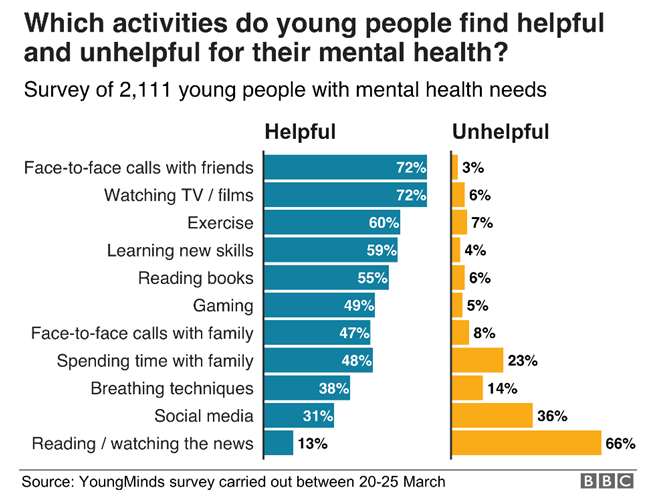Mental Health
What Is Mental Health ?

Mental health includes our emotional, psychological, and social well-being. It affects how we think, feel, and act. It also helps determine how we handle stress, relate to others, and make choices. Mental health is important at every stage of life, from childhood and adolescence through adulthood.
Over the course of your life, if you experience mental health problems, your thinking, mood, and behavior could be affected. Many factors contribute to mental health problems, including:
- Biological factors, such as genes or brain chemistry
- Life experiences, such as trauma or abuse
- Family history of mental health problems
Early Warning Signs
Not sure if you or someone you know is living with mental health problems? Experiencing one or more of the following feelings or behaviors can be an early warning sign of a problem:
- Eating or sleeping too much or too little
- Pulling away from people and usual activities
- Having low or no energy
- Feeling numb or like nothing matters
- Having unexplained aches and pains
- Feeling helpless or hopeless
- Smoking, drinking, or using drugs more than usual
- Feeling unusually confused, forgetful, on edge, angry, upset, worried, or scared
- Yelling or fighting with family and friends
- Experiencing severe mood swings that cause problems in relationships
- Having persistent thoughts and memories you can’t get out of your head
- Hearing voices or believing things that are not true
- Thinking of harming yourself or others
- Inability to perform daily tasks like taking care of yourself or getting school
Some Mental Health Conditions:
- Bipolar Disorder – Bipolar disorder is a disorder in which your mood can switch between extremes of happiness and depression, with episodes lasting for days or even weeks on end. It affects 1 in 100 people and tends to begin later in adolescence with symptoms usually starting between the ages of 15 and 19 in young people.
- ADHD – If you have attention deficit hyperactive disorder (ADHD), you may have lots of energy and find it difficult to concentrate. It can be hard to control your speech and actions. ADHD is the most common behavioural disorder in children. It usually starts at about 18 months old, but symptoms usually become noticeable between the ages of 3 and 7. We don’t know what causes ADHD but experts think it runs in families. It could also be caused by an imbalance in brain chemicals. A related condition, ADD (attention deficit disorder) has similar symptoms, but there is less hyperactivity and the main problem is difficulty concentrating.
- Anorexia – Anorexia is an eating disorder where you worry about your weight, want to lose weight and eat less and less food. It’s a serious condition, but with the right help, you can recover and take back your life. If things feel out of control, restricting what you eat could be a way of feeling more in charge. Girls are 10 times more likely than boys to develop anorexia, but eating disorders are becoming more common among males.
- Anxiety – Anxiety is a feeling of fear or panic. Feeling generally anxious sometimes is normal. Most people worry about something – money or exams – but once the difficult situation is over, you feel better and calm down. If the problem has gone but the feeling of fear or panic stays or even gets stronger, that’s when anxiety becomes a problem. With as many as one in six young people experiencing anxiety at some point, it is very common to have anxiety.
- Bulimia – It’s an eating disorder where you get into a cycle of overeating and then making yourself sick to try to control your weight. People with bulimia may have previously suffered from anorexia. You may feel that parts of your life are out of control, and that purging or restricting calories gives you a sense of control. Bulimia can seriously damage your body, so it’s important to get help and find other ways of coping. Although it’s a serious condition, there’s lots of help available.
- Depression – We all feel low or down at times but if your negative emotions last a long time or feel very severe, you may have depression. Depression is a mood disorder where you feel very down all the time. Depression can happen as a reaction to something like abuse, bullying or family breakdown, but it can also run in families. Depression often develops alongside anxiety It’s not the same as manic depression, which is another term for bipolar disorder Depression is one of the most common types of mental illness. Although it’s hard to feel optimistic when you’re depressed, there is lots of support available to help you feel better.
- Mania and hypomania – Mania is a feeling of being extremely ‘high’, with lots of energy and enthusiasm. It’s different from a normal good mood, because the feelings are very intense or go on for a long time. Mania can appear as part of bipolar disorder, or on its own. Hypomania is a milder form of mania.
- OCD – Obsessive compulsive disorder (OCD) is a type of anxiety disorder. It can be serious, but it’s very treatable. People with OCD have repeating thoughts, images or feelings that are distressing. They carry out rituals or habits (compulsions) to temporarily feel better. OCD rituals can be obvious to other people (like checking door locks) or they can happen inside your head (like counting or trying to counteract negative thoughts with positive ones). OCD thoughts come in all shapes and sizes, but they often revolve around things like danger, dirt and contamination, or worries around sexuality or religion.
- PTSD – Post-traumatic stress disorder (PTSD) happens after you experience something extremely frightening, like violence, abuse, rape or a life-threatening situation. It can also affect you if you witnessed something terrible happening, such as a serious accident. Most people take time to get over a traumatic event, but in PTSD, you can’t move past the event and carry on having dreams, flashbacks or upsetting thoughts about it. Complex PTSD is a more serious reaction to a long-lasting traumatic experience, for example abuse, neglect or frequent violence.
- Psychosis – Psychosis can be a symptom of serious mental illness like bipolar disorder or schizophrenia. It can also be related to stress, depression or drugs and alcohol. In a psychotic episode, a person loses touch with reality as other people see it. They might hear voices, see or feel things that aren’t there, feel paranoid or believe things that don’t rationally make sense. Although it can be scary, psychosis is treatable. Some people have one episode of psychosis and never have another one, while others might need ongoing treatment.
- Schizophrenia – schizophrenia is a condition where your experience does not match up with reality as other people see it, a symptom called psychosis. You might see, hear or believe things that for other people are not true. You can also feel muddled, low or withdrawn. Schizophrenia is a serious illness, but it can be treated. It usually appears between the ages of 15 and 35. The cause is unknown, but you’re more likely to experience it if a parent has it, or if you have had brain damage, drug and alcohol problems, or difficulties at home. Having schizophrenia does not mean you have a ‘split personality’ or that you are violent.
Ways to maintain positive mental health include:
- Getting professional help if you need it
- Connecting with others
- Staying positive
- Getting physically active
- Helping others
- Getting enough sleep
- Developing coping skills
- Set realistic goals
Please also see the useful information on our Emotional Health and Wellbeing page.
Impact of Coronavirus
The coronavirus crisis is undoubtedly having a huge impact on young people with or without existing mental health conditions. The loss of routine, being in lockdown, being away from wider family and friends, school closures and exam cancellations are all factors, as well as health concerns.
In a recent YoungMinds survey of over 2,000 young people the following activities were identified as being helpful and unhelpful for their mental health.
Image courtesy BBC
More information and survey results about the impact of coronavirus on children and young people can be found on our page here.
Mental Health Awareness Week: The Importance of Being Kind
This year’s theme is kindness, with the week running from 18 – 24 May.
The focus on kindness is a response to the coronavirus outbreak, which is having a big impact on people’s mental health.
Some people have mental health conditions like depression or anxiety, which means they have feelings that won’t go away and which start to really affect day-to-day life.
Mark Rowland, chief executive of the Mental Health Foundation, said: “We want to use Mental Health Awareness Week to celebrate the thousands of acts of kindness that are so important to our mental health. And we want to start a discussion on the kind of society we want to shape as we emerge from this pandemic.”
More information is available here.
Help and Support
Get help when you need it, seeking help is a sign of strength, not a weakness, and it is important to remember that treatment is effective. People who get appropriate care can recover from mental illness and addiction and lead full, rewarding lives.
There are many famous people who have mental health problems:
- Brittany Snow – the Pitch Perfect, star has anxiety attacks
- Kendal Jenner – has anxiety attacks
- John Nash – economic and math genius lived with paranoid schizophrenia
- Michael Phelps – Olympic gold medalist swimmer struggles with attention deficit hyperactivity disorder (ADHD)
- Elton John – singer, songwriter had an uphill battle with substance abuse and bulimia
- Demi Lovato – bipolar disorder, Demi say that it was such a relief to be diagnosed
- Professor Green – anxiety, Professor Green says he thinks he was born with this
- Ellie Golding – anxiety and panic attacks
- Stormzy – wrote a song about his mental health called ‘Lay Me Bare’
- Selena Gomez – panic attacks, anxiety and depression
The above is just a few famous names of celebrities who have diagnosed mental health conditions, all of the above support mental health awareness and have told their own stories to news and magazines. The message they all share is to get help and support to manage your condition, you can lead a good and productive life, never give up hope.
Helpful Links:
Wirral CAMHS (Child and Adolescent Mental Health Services) is a specialist mental health service that works with children and young people with moderate to severe mental health problems. CAMHS offers support to children and young people who are experiencing difficulties with the way they are thinking or feeling which are impacting on their mental health Information about their services for children and young people can be found here
Wirral CAMHS also have a 24 hour mental health support phone number: 0300 303 3972. More details here
Young Minds can be found here this is a really useful site and has many real life events from young people to help and support young people.
The Children’s Society more information with help and support here
My Mind for better mental health for more information see here
The Samaritans for help and support more information can be found here

